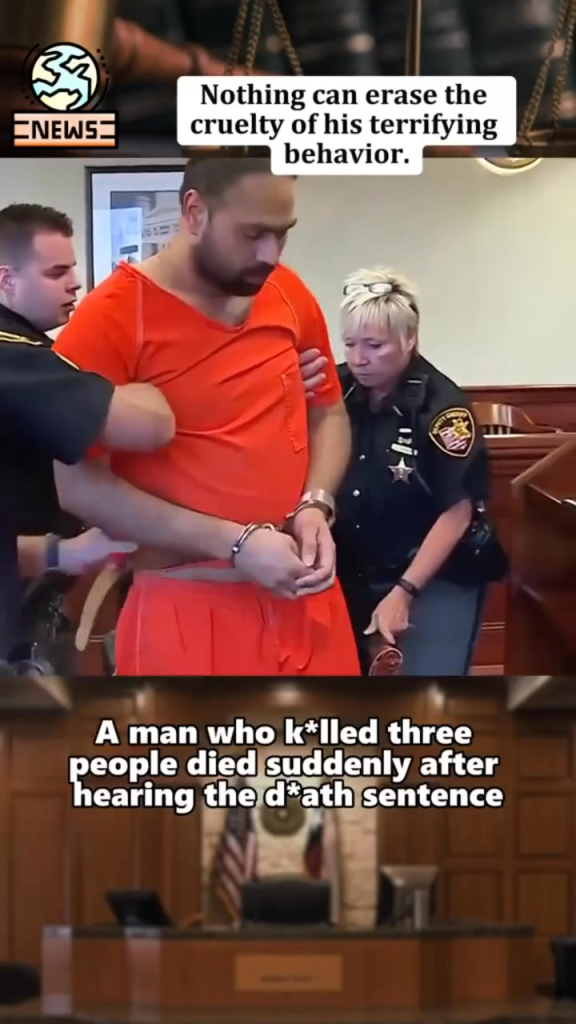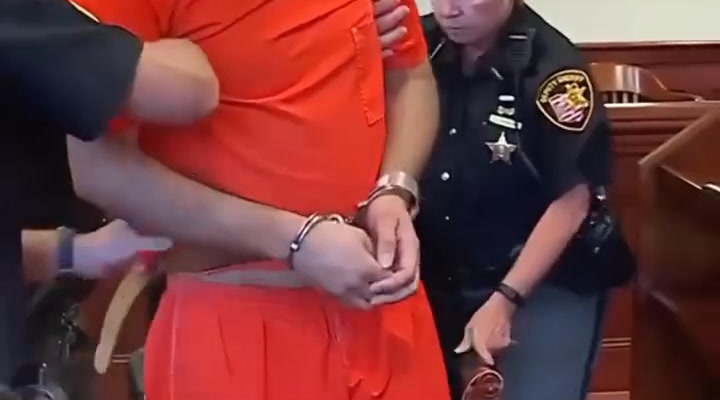Courtrooms are often seen as places of order, solemnity, and accountability. They are spaces where truth is examined, decisions are made, and lives are forever changed by a few words spoken by a judge. On one particular day, however, what was expected to be the conclusion of a long and emotional legal process turned into something no one could have anticipated — a moment that reminded everyone present just how fragile human life truly is.
This is the story of how a man’s final day in court took an unexpected turn, leaving behind deep questions about justice, fate, and the unpredictability of the human heart.
The Trial That Gripped Attention
For months, the case had captured public attention. It involved a man who had been convicted of taking three lives — a serious crime that had devastated families and shaken an entire community. The courtroom was filled with emotion as the day of sentencing finally arrived. Many had waited for this moment: the victims’ families, the defense attorneys, the prosecutors, and the journalists who had followed the case from the very beginning.
The man, who had already spent years in custody awaiting his final judgment, walked into court with visible tension. He appeared calm but withdrawn, his eyes fixed on the ground as he listened to the proceedings. Those who observed him noted that he seemed detached from his surroundings — perhaps preparing himself mentally for whatever the judge was about to declare.
When the sentence was read aloud, the entire room fell silent. For a brief second, time seemed to freeze. The man’s expression reportedly changed — first to disbelief, then to visible distress. Within moments, what began as a routine sentencing hearing turned into a scene of urgency.
The Unexpected Collapse
Witnesses later said that as soon as the judge finished speaking, the man appeared to lose his composure. He pressed a hand against his chest and stumbled backward before collapsing to the floor. People inside the courtroom reacted with shock and confusion. Court officers immediately rushed forward to assist, while medical personnel on standby were called in without delay.
According to reports, paramedics worked quickly to assess the situation. They administered emergency aid in an attempt to stabilize him. Despite their best efforts, the man could not be revived. Within minutes, it was clear that he had passed away.
The atmosphere inside the courtroom shifted from tense anticipation to stunned silence. The judge ordered the room cleared to give medical teams space to work, and everyone present was asked to step outside. Many left in disbelief, struggling to comprehend what had just unfolded before their eyes.
The Emotional Impact on Everyone Present
For the families of the victims, this moment brought an unexpected mix of emotions. Some had waited years for the court to deliver justice — a process marked by investigations, testimonies, and painful memories revisited again and again. To have the trial end in such an unforeseen manner left them feeling conflicted. While some expressed sorrow at the sudden loss of life, others felt that the man’s death had denied them the closure they hoped to find through the justice system.
Legal experts later explained that emotions during sentencing are often intense — not only for victims’ families but also for defendants. Years of stress, anxiety, and guilt can accumulate to a breaking point when the final judgment is delivered. It is, after all, the moment when one’s fate becomes real and irreversible.
Psychologists who specialize in trauma and high-stress environments noted that physical reactions to overwhelming emotional events are not uncommon. In some cases, the body simply cannot handle the sudden surge of adrenaline, fear, or despair that comes with a major life event.
Reactions from the Public and Media
As news of the incident spread, reactions were swift and varied. Some people online described the situation as a striking example of “poetic justice,” suggesting that fate had intervened in its own way. Others were more reflective, pointing out that regardless of the crime committed, every human life has value and that sudden death, even in such circumstances, should not be celebrated.
Social media platforms filled with discussions about morality, forgiveness, and destiny. Commenters debated whether the man’s passing could be viewed as a form of justice or whether it simply highlighted how fragile human existence is. Many urged compassion, reminding others that while accountability is necessary, society should not lose empathy in the process.
News outlets covering the story were careful to maintain a factual and balanced tone. They focused on the procedural aspects of the incident and the official investigation into the cause of death, avoiding speculation. Authorities quickly confirmed that a post-incident medical review would be conducted to determine exactly what happened.
The Official Investigation
Local authorities announced that an inquiry would take place to establish the precise cause of death. While preliminary indications suggested a heart attack triggered by stress or shock, officials emphasized that only a full medical examination could confirm the details. Autopsies and toxicology reports in such cases are standard practice to ensure transparency and accuracy.
Medical experts explained that sudden cardiac events can occur when a person experiences extreme emotional distress. The human heart, they said, is deeply influenced by psychological states — intense fear, grief, or anxiety can sometimes provoke life-threatening physiological responses, particularly if an individual has pre-existing health conditions.
The results of the investigation were awaited by both the court and the families involved. For the justice system, it was important to document every aspect of what occurred, ensuring that the case concluded properly and respectfully, even under such extraordinary circumstances.
A Broader Look at Human Fragility
Beyond the headlines, this story invites reflection on how intertwined the concepts of justice and mortality truly are. The courtroom — a place designed to weigh human actions — suddenly became a reminder that life itself can change in a single heartbeat. It illustrated that even in moments when society seeks accountability, the unpredictability of life can overshadow human plans.
Doctors have long noted that intense emotional or physical stress can sometimes trigger what is informally known as “broken heart syndrome,” a condition where severe emotional shock mimics the symptoms of a heart attack. In this context, the man’s collapse could be seen as an example of how emotions can directly influence physical health.
Such events are also reminders to the public about the importance of health monitoring and stress management, particularly for those undergoing prolonged emotional strain. Legal professionals, judges, and court officers witness highly charged emotional scenes frequently and are trained to maintain composure, but even they acknowledge that the human body has limits.
The Families’ Search for Closure
For the families affected by the crime, the end of the trial did not bring the sense of resolution they had anticipated. Some expressed disappointment that they would never see the convicted man serve his sentence or reflect on his actions behind bars. Others felt a quiet acceptance, believing that what happened was beyond anyone’s control — an act of fate that brought an unexpected conclusion to a painful chapter.
Victim advocacy groups later highlighted how complex emotional recovery can be after such cases. The absence of a conventional ending — such as the completion of a prison term — can make it harder for families to find closure. Counselors working with grieving families encouraged them to focus on healing, community support, and personal well-being rather than on the outcome of the legal process alone.
Ethical Reflections and Public Debate
The incident also reignited public conversations about the nature of justice. What does it mean when a sentence cannot be carried out due to circumstances beyond the control of the court? Is justice a process or an outcome? Philosophers, ethicists, and legal scholars weighed in, offering diverse perspectives.
Some argued that justice had already been served at the moment of conviction — that the truth had been established through due process, and society’s responsibility to uphold the law was fulfilled. Others maintained that justice is only complete when the punishment is enacted as intended, and that this case highlighted the limits of human systems in delivering perfect fairness.
The debate extended to social platforms and opinion columns, yet most commentators agreed on one central theme: the story was not about vengeance or satisfaction but about the unpredictability of life and the moral challenges that accompany the pursuit of justice.
Lessons for the Legal Community
From a professional standpoint, the incident served as a wake-up call for courts and law enforcement agencies. Many began discussing the importance of medical readiness in high-stress court environments. While security and order are always prioritized, this case showed that health emergencies can occur suddenly and require immediate response.
Judicial systems in several regions already include medical staff on duty during major trials, but experts suggested reviewing existing procedures to ensure preparedness for all eventualities. Simple measures — such as routine health checks for defendants and staff, better communication with medical teams, and improved emergency response protocols — could make a significant difference in future cases.
Compassion and the Human Side of Justice
Amid the legal analyses and public reactions, a deeper emotional truth emerged: no matter the circumstances, moments like these remind people of shared humanity. The sudden death of anyone, even a convicted person, evokes empathy because it underscores how fragile existence can be. For those present in the courtroom, it was a sobering reminder that justice and compassion are not mutually exclusive.
Many religious leaders and community figures commented on the importance of empathy, forgiveness, and reflection. They emphasized that while accountability is crucial, the loss of any life is still a tragedy that should be met with understanding rather than celebration.
How Society Responds to Tragedy
The broader social reaction reflected an ongoing tension in how people respond to stories of crime and punishment. Some view such cases strictly through the lens of moral consequence, while others focus on the human element — the families affected, the emotions involved, and the psychological toll on everyone connected to the event.
Media organizations covered the story responsibly, taking care not to sensationalize or glorify the incident. Instead, many outlets framed it as a human-interest piece — a cautionary tale about the limits of the body and the power of emotional stress. This measured reporting style aligned with ethical journalism principles and the broader need to maintain public sensitivity.
Remembering the Bigger Picture
In the end, the story of the man who collapsed and died in court is not simply about a legal proceeding that took an unexpected turn. It is a profound reminder of how life, justice, and mortality can intersect in ways that defy expectation. For the victims’ families, it became another chapter in their long journey toward healing. For the legal system, it highlighted the importance of preparedness and compassion. And for society at large, it served as a reflection on how easily circumstances can change — often without warning.
Final Thoughts: The Intersection of Accountability and Humanity
Every courtroom holds within it countless stories of human emotion — anger, grief, fear, and sometimes, hope. On that day, one man’s heart could no longer bear the weight of the moment. His passing transformed a place of judgment into a space of reflection.
Justice was served in one sense — the truth was acknowledged, and the court fulfilled its role. Yet the outcome also revealed something deeper: the inevitability of human vulnerability. No system of law, no matter how structured, can fully control the unpredictable nature of life and death.
The lesson from this story extends beyond the courtroom walls. It invites everyone to think about empathy, accountability, and the fragility of existence. It reminds us that even in the pursuit of justice, compassion remains essential. And it shows that every ending — no matter how sudden or surprising — carries within it a quiet call to understand the human heart, both in its strength and in its breaking.




